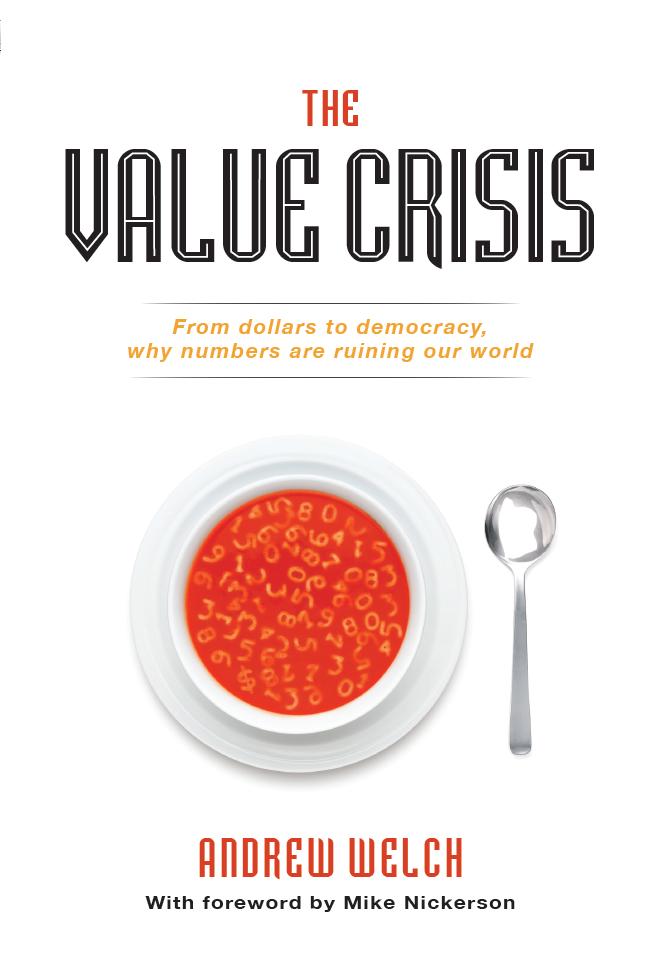
Chapter Summary
The work opens with some surprising stories from the history of numbers and how humans and other animals are wired to work with them. While most believe numeracy to be a fairly straightforward skill, numbers can fool us in unexpected ways. We are also introduced to the concept of a value system based on numbers.
Number-based value systems are limitless, linear, and consistent, while innate human value systems have none of those properties.
How do we evaluate choices and make decisions? Working from several real-life examples, this complex process is explored. The mechanics are a bit different for everyone, but when the results are compared to the objective calculations, some puzzling irrationalities emerge. Still, some of us often choose to ignore our personal value systems. Why?
Decisions using number-based values are easy to make, easy to defend, and seemingly less susceptible to our innate numerical irrationalities.
An offhand remark about poor travel etiquette kicks off an engrossing exploration of the history of money, and its impact on society right up to our current age of globalization. The result is a whole new way to think about the value of money, and how that concept interacts with our other value systems.
Money has evolved from an object you needed for survival, to a currency that might buy what you needed for survival, to a number in a database that you need to trust for survival.
Building on the pioneering work of Abraham Maslow and Frederick Herzberg, this chapter explores why we do what we do, and the role money plays. Clearly our human value systems, which have evolved over millennia, make no use of numbers or mathematical operations. Yet these concepts and operations now play a pivotal role in our personal value systems.
Increased wealth will produce an increase in standard of living, but once a certain threshold is reached, more money will not make us happier.
We don't just count our dollars - we also count our minutes and hours. Time is a singular resource in our society, and much effort is spent translating it into dollars, but are there other ways to determine a value for time? In addition to exploring that question, this chapter also examines compensation fairness and proposes alternatives to high labour costs.
Taxing raw material extraction
instead of labour would increase market sustainability, product quality, consumer satisfaction, and employment.
To understand the true value of money in the modern age, one must acquire a basic grasp of our banking system and the concept of creating wealth through mathematical operations alone. We also look at the growing economy itself, and see what staggeringly inconceivable numbers come into play when the system goes out of control.
More than 99% of the money in our economy is created by banks through loans, representing future value that does not yet exist.
Publicly-traded corporations, being 'legal persons' exclusively governed by the principles of a monetary value system, present a very unique specimen for an exploration of values. While their actions are sometimes condemned as 'evil', in reality they're only doing precisely what they're programmed to do, and what we demand of them. Indeed, that predictability allows us to propose an exciting new proposition for understanding corporate behaviour, using a familiar model.
Publicly-traded corporations are a separate social species. They make independent decisions, operate under a distinct value system, and exhibit their own characteristic behaviours.
Richard Leakey said: "We are most certainly the only animal that makes conscious choices that are bad for our survival as a species." Conscious choices are based on values, and it is a change at the value level that has created the crisis we currently face. The problems are not insoluble, but a paradigm shift is required, beginning with an awareness of why we face these challenges in the first place.
We've become addicted to a constantly growing economy, and to get our short-term fix, we are willing to make some very unhealthy choices.
Democracy is in fact a number-based value system, where the decisions are made solely on the basis of their polled popularity. New tools now give us more effective and powerful ways to engage the right people at the right time to arrive at better solutions for a variety of community and even global challenges. Are we ready for a wikiocracy?
Majority rule results in the best decisions only when the population is sufficiently informed, interested, engaged, and consulted - typically a rare combination.
 OUR VALUE PERSONAE
OUR VALUE PERSONAE
Building on the work of Robert Reich, this chapter defines three core value personae that exist in all of us: the Consumer, the Investor, and the Citizen. These values are in direct conflict, but such conflicts are constantly managed in individuals. It is when those personae are separately represented at the societal level (by the Marketplace, Corporations, and Governments) that we see the totally inadequate representation of our critical Citizen values.
As citizens, we value social responsibility and a healthy environment; as consumers, we want lower prices and more selection; as investors, we want to profit from a continually growing economy.